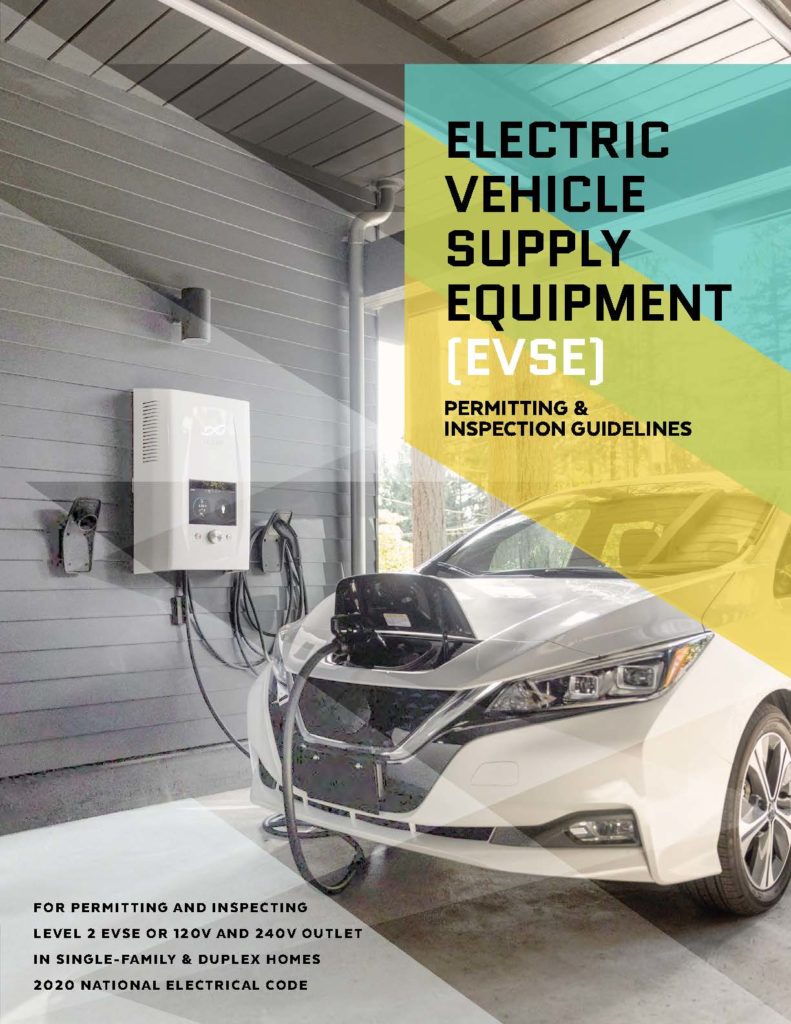Electric Vehicle Supply Equipment, Energy Storage and Solar Permitting and Inspection Guidelines
Guideline / March 26, 2024 / Codes And Policy

In many parts of the United States, navigating building permits required for distributed energy resources such as solar, storage, and electric vehicles (EVs) can be a daunting process. Under a three-year project funded by the Department of Energy, NBI has led the development of a series of guidelines to streamline the permitting and inspection processes for distributed energy resources to reduce carbon emissions, save people money, and help balance energy supply and demand on the grid.
These guidelines provide an overview of code requirements for the installation of Electric Vehicle Supply Equipment and Energy Storage Systems (stand-alone and paired with simple photovoltaic systems) in single-family, multifamily, and office buildings. By providing specific and replicable lists of permitting and inspection requirements, local jurisdictions can streamline the permitting and inspection process by reducing informational barriers while helping ensure the design and installation of these distributed energy resources are consistent, code compliant, and safe.
In 2023, NBI and partner organizations piloted the guides in several jurisdictions around the country to refine their content.
Electric Vehicle Supply Equipment Guidelines
These guides provide an overview of code requirements for the installation of Level 2 Electric Vehicle Supply Equipment (EVSE) installations and 120V or 240V outlets in single-family dwellings, and in multifamily and office buildings.
EVSE – Single Family Dwellings
The guides reference the 2020 NEC and 2017 NEC. Each guide has a version without application pages, if preferred. Download the respective versions below:
- 2020 NEC Versi0n (PDF)
- 2020 NEC Version (PDF)
- 2020 NEC Version, without sample application form (PDF)
- 2017 NEC Version (PDF)
- 2017 NEC Version, without sample application form (PDF)
EVSE – Multifamily and Office Buildings
The guides reference the 2020 NEC, 2021 IBC, and 2017 ICC A117.11, as well as the 2017 NEC, 2018 IBC, and 2017 ICC A117.11. Each guide has a version without application pages, if preferred. Download the respective versions below:
- 2020 NEC Version (PDF)
- 2020 NEC Version, without sample application form (PDF)
- 2017 NEC Version (PDF)
- 2017 NEC Version, without sample application form (PDF)
Solar and Energy Storage System Guidelines
Solar – Single Family Dwellings
The guides reference the 2020 NEC, 2021 IRC, and 2021 IFC, as well as the 2017 NEC, 2018 IRC, and 2018 IFC. Each guide has a version without application pages, if preferred. Download the respective versions below:
- 2020 NEC Version (PDF)
- 2020 NEC Version, without sample application form (PDF)
- 2017 NEC Version (PDF)
- 2017 NEC Version, without sample application form (PDF)
Solar – Multifamily and Office Buildings
The guides reference the 2020 NEC, 2021 IBC, and 2021 IFC, as well as the 2017 NEC, 2018 IBC, and 2018 IFC. Each guide has a version without application pages, if preferred. Download the respective versions below.
- 2020 NEC Version (PDF)
- 2020 NEC Version, without sample application form (PDF)
- 2017 NEC Version (PDF)
- 2017 NEC Version, without sample application form (PDF)
Training Videos
The video below is an on-demand webinar that introduces the Solar and Energy Storage System Permitting Inspection Guidelines.
The video below is an on-demand webinar that introduces the
EVSE Permitting Inspection Guidelines
The video below is an on-demand webinar that introduces the EVSE Permitting Inspection Guidelines.
If you would like to receive CEUs for these trainings, register for the EVSE permitting and inspection guide training or the ESS and Solar permitting and inspection guide training on IREC’s Clean Energy Resources and Training website.
For more information on this project, read our blog or contact Amie Lewis at [email protected]
This material is based upon work supported by the Department of Energy and Office of Energy Efficiency and Renewable Energy (EERE), under the Building Technology Office (BTO) Award Number EE0009457.
